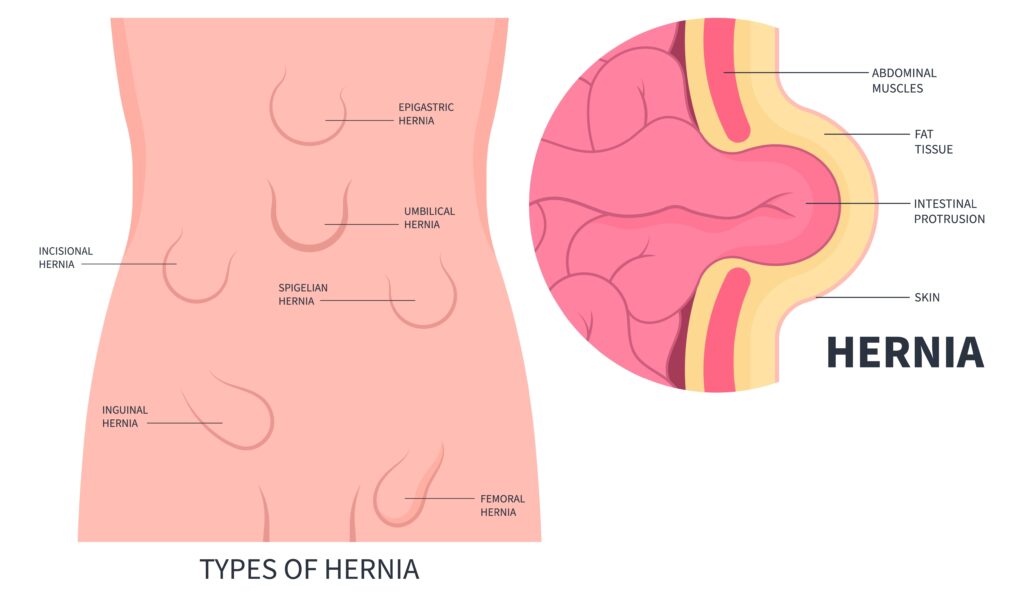Hernias are a common medical occurrence that can cause discomfort and disrupt daily life. At Mason City Clinic, we understand the importance of education and awareness when it comes to hernias and their treatment options. In this article we’ll delve into the most frequently asked questions about hernias and hernia surgery so that you can be empowered to make informed decisions about your health.

A hernia occurs when an organ or tissue protrudes through a weak spot in the surrounding muscle or connective tissue, creating a bulge or lump. Hernias commonly occur in the abdomen, groin, or upper thigh areas.
Symptoms of a hernia may include a visible bulge or lump, pain or discomfort, especially when lifting heavy objects or straining, a feeling of heaviness or pressure in the affected area, and sometimes nausea or vomiting.
Hernias can develop due to a combination of factors, including weakened abdominal muscles, persistent heavy lifting, sudden or excessive strain on the abdomen, obesity, chronic coughing or sneezing, and previous abdominal surgeries.
While some hernias may not cause significant symptoms initially, leaving a hernia untreated can lead to complications such as incarceration (trapping of tissue in the hernia sac), strangulation (loss of blood supply to the trapped tissue), and bowel obstruction, which require emergency medical attention.
Yes, there are several types of hernias, including inguinal hernias (located in the groin), femoral hernias (lower groin), umbilical hernias (around the belly button), hiatal hernias (in the upper stomach), and incisional hernias (at the site of a previous abdominal surgery).
Hernias are typically diagnosed through a physical examination by a healthcare provider. In some cases, imaging tests such as ultrasound, CT scan, or MRI may be recommended to confirm the diagnosis and assess the size and severity of the hernia.
If you suspect you have a hernia or experience symptoms such as pain, discomfort, or a visible bulge, it’s important to seek medical attention promptly. Your healthcare provider can evaluate your condition and recommend appropriate treatment options.
Treatment options for hernias may include watchful waiting (monitoring the hernia without immediate intervention), lifestyle modifications, such as avoiding heavy lifting or straining, supportive garments or trusses to help support the hernia, and surgical repair, especially for symptomatic or larger hernias.
While not all hernias require surgery, surgical repair is often recommended for symptomatic or larger hernias, as well as for hernias that are at risk of complications such as incarceration or strangulation.
As with any surgical procedure, hernia surgery carries certain risks, including infection, bleeding, recurrence of the hernia, injury to surrounding organs or tissues, and adverse reactions to anesthesia. However, these risks are typically low, especially when performed by an experienced surgeon.
Laparoscopic hernia repair is a minimally invasive surgical technique that uses small incisions and specialized instruments to repair hernias. This approach offers several benefits, including shorter recovery times, less postoperative pain, and smaller scars compared to traditional open surgery.
The recovery time after hernia surgery varies depending on factors such as the type and size of the hernia, the surgical approach used, and the individual’s overall health. In general, most patients can resume light activities within a few days to a week after surgery, with full recovery taking several weeks.
In the immediate postoperative period, your healthcare provider may recommend a soft or liquid diet to allow the surgical site to heal. Additionally, you may be advised to avoid heavy lifting, strenuous activities, and certain foods that can increase the risk of constipation or strain on the abdomen.
While hernia recurrence is possible, especially with larger or more complex hernias, the risk of recurrence is generally low, especially when surgical repair is performed by an experienced surgeon using appropriate techniques.
While hernias and muscle strains can cause similar symptoms such as pain or discomfort, a hernia typically presents as a visible bulge or lump that may be felt when standing or straining. If you suspect you have a hernia, it’s essential to seek medical evaluation for an accurate diagnosis.

Yes, hernias can be dangerous if left untreated, as they can lead to complications such as incarceration, strangulation, and bowel obstruction, which require emergency medical intervention. Prompt diagnosis and treatment are essential to prevent complications and ensure optimal outcomes.
While exercise is generally beneficial for overall health and well-being, individuals with hernias should avoid activities that increase intra-abdominal pressure or strain on the abdominal muscles, such as heavy lifting, intense abdominal exercises, and activities that require repetitive bending or twisting.
In many cases, individuals with hernias can still engage in moderate physical activity and exercise, as long as it does not exacerbate symptoms or increase the risk of complications. It’s essential to consult with your healthcare provider for personalized guidance on safe and appropriate exercise options.
While some risk factors for hernias, such as age, gender, and genetics, are beyond your control, there are steps you can take to reduce your risk of developing a hernia, including maintaining a healthy weight, avoiding heavy lifting, practicing good posture, and addressing underlying medical conditions such as chronic coughing or constipation.
While surgical repair is the most effective treatment for hernias, certain lifestyle modifications, such as wearing supportive garments or trusses, may provide temporary relief from symptoms, especially for individuals who are not surgical candidates or prefer non-surgical options.
Hernias and hernia surgery are common medical concerns that can significantly impact a person’s quality of life. If you or a loved one are experiencing symptoms of a hernia or considering surgical intervention, it’s essential to consult with a qualified healthcare provider to discuss your options and develop a personalized treatment plan.
At Mason City Clinic, our experienced surgeons are dedicated to providing compassionate care and exceptional outcomes for patients undergoing hernia surgery. If you have any further questions or would like to schedule a consultation, please call your primary care physician and ask for a referral to a board certified general surgeon at the Mason City Clinic. Your health and well-being are our top priorities, and we’re here to support you every step of the way.
Up-to-date. Down-to-earth. Close to home. Lots of great reasons to make Mason City Clinic
your first choice for all your family’s specialty healthcare needs.
250 S. Crescent Drive, Mason City, IA 50401
Tel: 641.494.5200
Toll Free: 800-622-1411
Fax: 641.494.5403